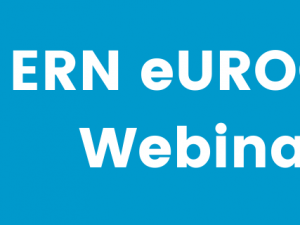The Orphanet Data for Rare Disease 2 (OD4RD2) project, led by Orphanet, held its final meeting on 5 and 6 November 2025 in Paris, France.
OD4RD2 was launched in 2023 as a three-year project to build on and expand the achievements of the previous OD4RD pilot project (2022). Its main objectives are to contribute to the generation of standardised, interoperable data on rare disease diagnoses for primary and secondary use; to contribute to the harmonisation of data collection among multiple settings and countries; and to contribute to supporting evidence-based decision-making within the framework of the European strategy around the European Reference Networks (ERNs).
Peter Mulders, ERN eUROGEN Coordinator, and Michelle Battye, ERN eUROGEN Programme Manager, attended the second day, which gathered 61 participants, including all project partners, representatives from 17 ERNs, the European Health and Digital Executive Agency (HaDEA), DG SANTE, European Rare Diseases Research Alliance (ERDERA), and Joint Action on Integration of ERNs into National Health Systems (JARDIN).
This second day aimed to broaden the meeting’s scope and ensure comprehensive coverage of all relevant topics by fostering collaborative brainstorming and actively inviting stakeholder feedback to capture all needs. In the afternoon, two rounds of parallel working groups took place to facilitate brainstorming with the ERNs about potential unmet needs and gaps to be addressed.
Discussions focused on:
- Improving scientific collaboration with ERNs, including nomenclature and scientific information;
- Supporting ERN registries, particularly in transforming their data into reusable knowledge;
- How to enhance Orphanet’s contribution to the dissemination of ERN coding guidelines and other knowledge;
- How to support the implementation further; and
- Adoption of ORPHAcodes in Member States in parallel with the actions of National Hubs and JARDIN.
Overall, the two days provided a comprehensive and forward-looking platform for reflection, exchange, and strategic planning. They laid a solid foundation for the forthcoming OD4RD3 project, ensuring that future work will continue to advance harmonised RD codification across Europe, enhance scientific collaboration with ERNs and data usability, and support high-quality, interoperable knowledge generation for the benefit of the entire rare disease community.
ERN eUROGEN has already successfully collaborated with Orphanet to revise the ORPHAcodes for spinal dysraphism (together with ERN ITHACA) and anorectal malformations. Positive feedback on how these collaborations went was given during the meeting, along with the suggestion that, when a complete overhaul of the classification was needed to revise the ORPHAcodes (as was the case with spinal dysraphism), face-to-face meetings between an ERN and Orphanet are more efficient.
ERN eUROGEN has identified the next of its Expertise Areas needing an ORPHAcodes update: rare bladder inflammatory diseases, and discussions will start with Orphanet to plan this work.
We welcome suggestions from the network for other areas where the ORPHAcodes need updating.





